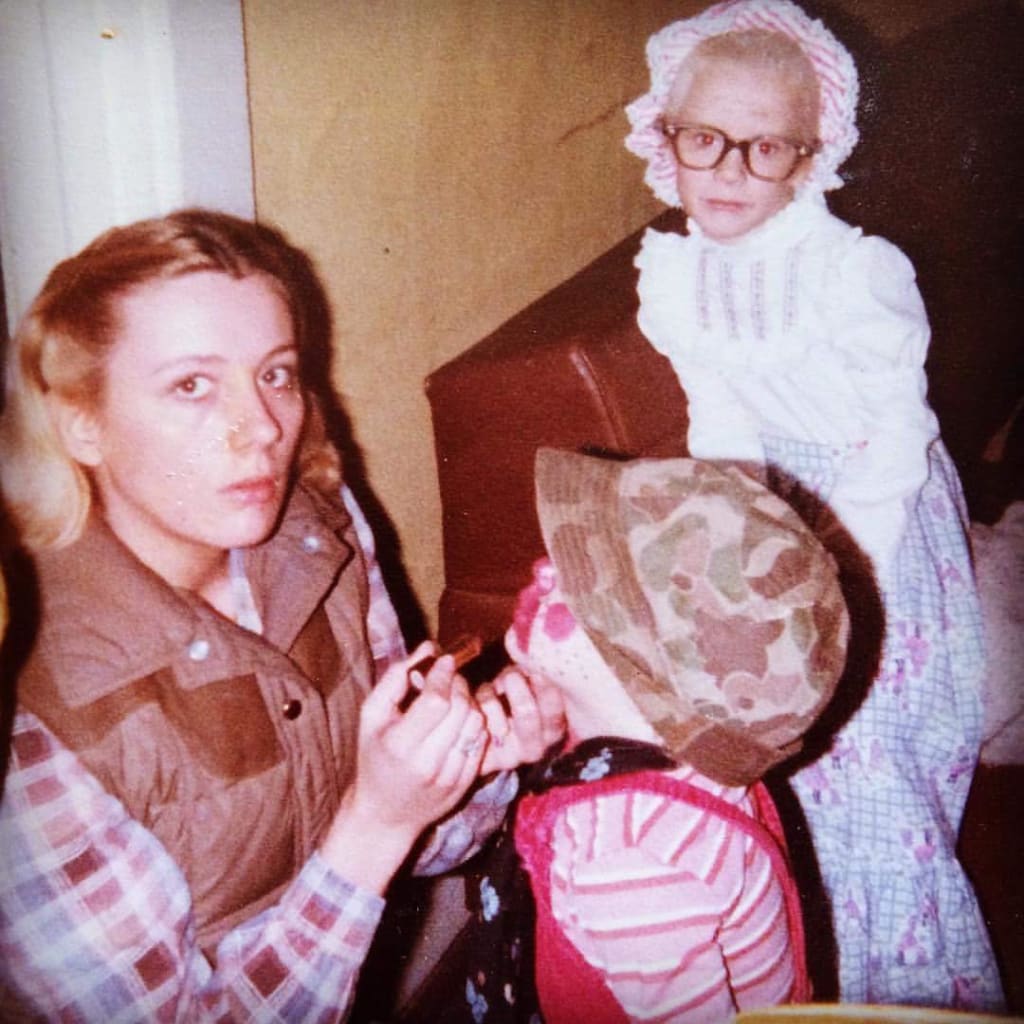The Dreams of the Mother
On Achieving One's Own

“Do you like what you’re reading?”
My mom’s voice from the door of the bedroom we share in my great grandmother’s house startles me. My cheeks are hot, and looking into the mirror of the dresser I’m standing in front of, I can see that they’re pink, my green eyes wide in a mix of fear and confusion. On top of the dresser is a stack of papers, typed carefully by my mother on her old typewriter. “Willie the Fisherman’s Parrot” by Cathy *** ******, it’s titled. It’s my mom’s book in progress, and while at the age of five years old, I can read it quite easily, it isn’t what I was doing.
In fact, with my mom standing there, an inscrutable look on her face, and a growing sense of dread crawling up the back of my throat, I don’t even remember what I was doing in front of the dresser.
Not knowing what answer she wants, but feeling as if I’m about to be in trouble, I shake my head in a silent no. She sighs, looks away, and goes back to whatever she was doing. Getting ready for work where she managed a Captain D’s, most likely, or heading out to my agoraphobic grandmother’s house to clean or cook.
For most of my childhood and into my adult life, my mom identified as a writer. She filled notebook after notebook in her lovely longhand with curly C’s and shapely S’s, and depleted ribbon after ribbon on her typewriter. Eventually she switched to a stand alone word processor, and then to a computer. She wrote some articles that were published in local newspapers, and for one very happy summer, wrote ad copy for a swanky catalogue company until my stepfather complained that she wasn’t making enough money and pressured her into going to nursing school.
But she never let me, or anyone, read anything else she wrote. She hid it away, hence my uncertainty about finding a copy of some of it lying out in the open.
And hence my certainty that her question, “Do you like what you’re reading?”, held an undefined danger.
Now, I have a couple of short stories that she wrote and edited to death, and notebooks filled with notes and snippets of writing for two large novels that she worked on for decades.
In the truest sense of the word, my mom was a writer because she wrote. But she never became what she wanted to be, because she couldn’t allow herself to believe that it was okay for her to do it. She couldn’t let herself share it with other people.
Carl Jung wrote once that “The greatest burden a child must bear is the unlived life of the parents.”
When she died in 2009 at the age of 54, I inherited a $2,000 insurance payout (my stepfather pocketed the rest), a Kitchen Aid mixer which I use for all of my stress baking, her golden retriever, Claire, and a hefty unlived creative life of my mom’s making.
When I sit down to write now, my own unfinished, award winning novel of six years spiking the brew of insecurity and uncertainty in my mind, my mother sits beside me. She doesn’t say anything usually, but we both know what she’s thinking: If I couldn’t do it, what makes you think you can? How long do you think you’ll live anyway? You’re 45 years old, divorced, barely making ends meet working in a beer factory.
It’s a brewery, Mom, I say.
It’s a factory, Mandy.
And so it goes, my mom sitting there thinking things that I know she would never actually say if we were both lucky enough for her to sit beside me once more, especially now that she’s been to the other side and is purely her own loving self. But here, conjured by the weight of her unlived dreams woven into the weight of my own, like a brutal blanket of chains, she says everything I know will keep me from writing.
Sometimes I practice Anne Lamott’s exercise from Bird by Bird, turning my mom into a mouse and placing a jar over her so that I can’t hear her. I can still see her mouthing the words of failure through the beveled glass, shouting at me that it’s too late.
Middle age is tough for everyone, I hear. Parents and their expectations and dreams are challenging. Starting over in middle age, a mere decade younger than your primary parent was when she died, with four teenage-ish sons looking to you for direction, is a special challenge. There are more divorces and funerals in front of me than there are weddings and babies and new jobs, I think daily with a determined grimness.
And although I know that I’m a writer, that I’ve always been a writer, I have no proof as of yet that my fate will not be the same as that of my mother; that in ten years time, I won’t have left my then grown children and maybe grandchildren a stack of notes and half written novels and overdue library books and hospital bills. I don’t know that my unlived dreams won’t become the nightmares that plague them through their own creative lives.
Except that, I’m still here. For now, I have the power to sit down each day in front of a fresh piece of notebook paper or a blank screen and put down my words. I can pick up a canvas like I did this weekend and paint on it, with colors I love and crude strokes, reminding myself that if I can paint for me, I can write for me, too. And if I write for me, and just keep writing, then I will have pieces that I can share with the world.
In between that, I do, of course, read millions of articles and blog entries about writer’s block and creating professionally and doing your creative work when you work a demanding day job (regarding beer factories: Imagine doing cross fit for ten hours a day in Hell. Add skin stripping chemicals and radical gremlins and other equally tired humans who like a good pint of frothy peace, but run daily gauntlets to get there). I read other writers’ takes on how to stay motivated, how to organize, how to publish. I periodically reconnect with my professional writing group.
But lately what I have found to be most freeing, most liberating of the words stuck stubbornly behind my fears? Speaking honestly and compassionately with my dead mother about her dead dreams.
“Mom, I know that I’m getting older, and maybe don’t have that much time left. So every day, I’m sitting down and doing what you didn’t think you deserved to do. I’m doing it for me, and I’m doing it because of you. I could let the fact that you didn’t get to finish what you started be a damning sign of my own fate, or I can believe in myself the way we both wanted you to believe in yourself. It’s okay that you didn’t finish. You were a writer. You are a writer. And I am too.”
In the final moments before my mother died, when I realized that she was holding on, waiting to be let go, I held her hands and whispered, “You are a good mom and a good grandmother. You are loved. It’s okay to let go.” And when she did, when she sighed and left, I have to believe that she was released of all the burdens of her unlived dreams, and that I have to let myself be released of them as well.
And mom, if you are reading this, you’re right. I do work in a beer factory.
And I am a writer.
And Willie the Fisherman’s Parrot was a damn good story, even if you had to die before I could read it.
About the Creator
Amanda Lee Scherle
A stage actor and writer, Amanda works full time in the craft beer industry, brewing and packaging beer. She lives in NC with her four gangly sons, two cats, and one very needy rat terrier mix.






Comments
There are no comments for this story
Be the first to respond and start the conversation.